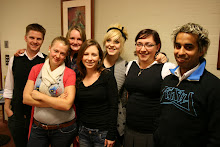Jambo na karibu Rafikis!
After month of preparation in perth, and 12days experience in Kenya, we ventured yesterday into the Kibera slum. we were accompanied by our guides and new friends from the Edmund Rice centre, most of whom actually live in the slum.
it was an intense, confronting and challenging experience. Home to between 1 and 3 million people, Kibera is a maze of tiny clay huts with corrugated iron rooftops, separated by undulating paths of rocks and holes and dirty streams of water. there were people, mostly children, everywhere.
i was overwhelmed by the squallor,filth and deep sense of pride and community that emanated from the clutter of houses.
as we travelled to the sounds of children chanting "howareyou! howareyou!", i wished i could've lifted my eyes from my precarious footwork, as there was so much to take in. it was like being in a completely different world. we all felt lucky that we had been given such extensive preparation in the forms of research, formation meetings discussing culture and risk management, because without that grounding and prior expectations, i think we would've struggled a significant amount more.
in small groups, we visited different areas of the slum, including orphanages, schools, homes of people bedridden by HIV Aids, and homes of those living with the disease. in my group, we met a woman who is unlike anyone i've ever met before, but unfortunately is a common character in the Kibera Slum. Josephine lived in a house no bigger than a small bathroom, she had six children, two of which had been taken away to boarding school, and the other four being under the age of ten. she also cared for her 17yr old niece who contracted HIV the previous year, and had come to live with her in order to get access to the freely distributed AntiRetroVirals in Kibera. Her niece had a son who was also positive, but was taken away to a hospital so he could recieve necessary care. While her Husband was unemployed and spent the day sleeping, she looked after all the children, did the cooking and cleaning, went to the forest to illegally chop firewood, carry it all the way back and then take it to market to sell. after we left, our guides told us that if she did not have dinner prepared for her husband every night, he would beat her.
it is a terrible fact that this is not a unique situation. sitting in her tiny house and hearing her story was an immensely challenging and almost harrowing experience.
i never knew the meaning of hard work until that day.
That night, i was left reeling from the events of the day. such strong images kept flashing back into my head; a half-naked toddler crying alone on the railway tracks, women washing clothes in buckets on the street, the big, welcoming smiles of members of the community, climbing up rocky alleyways carefully not falling in rubbish. the camp we will begin on Monday will be tough, but i am so looking forward to it. i believe we are able to embark on this camp experience with a greater depth of understanding because of the immersion process we have participated in over the past 12 days and previous months, and especially by experiencing first-hand the conditions in which these people live.
kwaheri
Sally
Saturday, December 13, 2008
Subscribe to:
Post Comments (Atom)

No comments:
Post a Comment